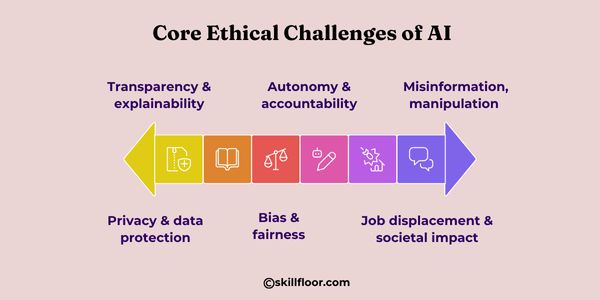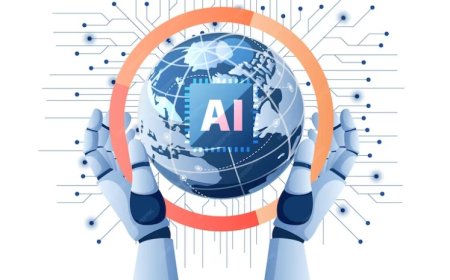Ethics in Artificial Intelligence: Why It Matters
Discover why ethics in AI matters. Learn about bias, privacy, transparency, and accountability for building responsible, human-centered AI systems.

In 2025, the world is going through an ethical revolution in addition to a technological one. According to the Stanford Institute for Human‑Centred Artificial Intelligence AI Index Report, legislative mentions of artificial intelligence surged by 21.3% across 75 countries since 2023, marking a nine-fold increase since 2016. At the same time, 68% of consumers say they’re concerned about misinformation generated by AI-powered technology, flagging a deep distrust in the systems increasingly shaping our lives. This rising wave of adoption brings enormous promise but also serious ethical risks. And those risks aren’t future problems: they are happening now.
Whether you’re a business leader, a developer, a digital marketer, or simply someone curious about how technology is influencing our world, understanding the ethics of artificial intelligence (AI) isn’t optional; it’s urgent. Explore why ethics in AI matters, what the key ethical challenges are, how organizations and individuals can respond, and what the future might look like if we either embrace or ignore these responsibilities.
1. Why Ethics in AI Should Be a Priority
The pace of AI adoption is staggering
From chatbots that assist customer service to automated hiring tools, AI is embedded in our everyday lives more than ever. The business case is clear: generative AI investments are expected to exceed US$10 billion in 2025, reflecting the shift from experimentation to enterprise-scale adoption.
But with great scale comes great responsibility.
-
When systems make decisions that affect people’s lives, fairness, transparency, and accountability matter.
-
When data about individuals is used to train powerful models, privacy and consent matter.
-
When autonomous agents act without full human oversight, governance and control matter.
Public trust is under threat
As mentioned above, nearly 7 in 10 consumers fear that AI systems will spread misinformation or be misused. That’s not just a PR challenge; it’s a business and societal risk. If people don’t trust the systems around them, adoption slows, outcomes worsen, and the vulnerable are often hit hardest.
It’s no longer just “nice to have”; regulation is coming
Ethical frameworks used to be optional. Today, governments are acting. For example, the Artificial Intelligence Act in the European Union sets out guidelines for banning abusive AI practices and protecting citizens from algorithmic manipulation. That means organizations that ignore ethics will not only face reputational risk but also legal and regulatory risk.
2. The Core Ethical Challenges of AI
Here are the most pressing ethical issues facing AI today, and why they demand our attention.
One of the most pervasive risks is algorithmic bias: when AI models reflect or amplify existing inequalities. For example, a hiring tool might favor candidates of a certain gender or ethnicity because of biased training data. A research study identifies bias (alongside privacy and transparency) as a major obstacle in AI adoption.
Why it matters: Biased systems risk unfair outcomes, discrimination, and loss of faith in technology.
Transparency & explainability
Many modern AI models, especially deep-learning-based, function as “black boxes.” How did the system reach its decision? What data was used? In many cases, it's unclear.
Why it matters: Without transparency, it’s difficult to trust AI decisions or audit them when things go wrong.
Privacy & data protection
AI thrives on vast data sets. These often include personal or sensitive information. How that data is collected, used, shared, and stored raises serious ethical questions.
Why it matters: Privacy violations undermine rights, invite regulation, and damage reputations.

Autonomy & accountability
As AI systems gain more autonomy, making decisions without explicit human intervention, who is responsible when things go wrong? A study warns of “algorithmic influence, manipulation, accountability, liability”.
Why it matters: Clear responsibility is required for trust and legal compliance.
Job displacement & societal impact
Automation driven by AI may lead to workforce disruption. While some jobs will be created, others will vanish or fundamentally change. Ethical deployment demands planning for the human impact.
Why it matters: Societal trust and stability depend on responsible transitions.
Misinformation, manipulation & democratic risks
AI is very good at generating convincing content, text, images, and videos. That opens the door to misinformation, propaganda, and mass manipulation.
Why it matters: When truth is undermined, democratic systems and social cohesion suffer.
3. Why These Ethical Issues Aren’t Just “Tech Problems”
You might think, “Well, ethics is for philosophers; I’m just focused on building a product.” But here’s the catch: ethics in AI directly impacts business, society, and you.
Business and brand risk
If your AI system produces biased outcomes or misuses personal data, the backlash can affect customer trust, regulatory compliance, and brand reputation.
Innovation and adoption risk
Organizations that neglect ethical considerations may face slower adoption, higher compliance costs, or even bans limiting what they can do.
Human impact
Behind every dataset and algorithm are real people whose lives can be changed, sometimes harmed by technology. Ethical AI isn’t just about laws; it’s about people.
Global scenery
AI ethics is increasingly embedded in policy, law, and international agreements. Ignoring it means being out of step with the global direction.
4. How to Build Ethical AI: Practical Approaches
So what can organizations and individuals do to build AI responsibly? Here’s a roadmap of considerations and best practices.
a) Define your values and purpose
Start by asking: Why are we building this? Whom will it serve? What harms might it cause? A clear purpose, grounded in human values, helps steer design.
b) Engage diverse stakeholders
Bring in domain experts, ethicists, users, and diverse voices. According to IBM’s commentary, multidisciplinary teams improve oversight and reduce blind spots.
c) Embed ethics from design to deployment
-
Use transparent data sourcing and document your data.
-
Audit for bias and fairness regularly.
-
Provide explainable outputs or decisions.
-
Monitor systems post-deployment for unintended consequences.
d) Ensure oversight and accountability
Make sure there’s clarity on who is responsible for decisions and outcomes. Transparent logging, audit trails, and human-in-the-loop mechanisms help.
e) Protect privacy and control data
-
Minimize the use of personal data where possible.
-
Use anonymization, synthetic data, and limited retention.
-
Respect user consent and data rights.
f) Monitor societal impact
Think beyond the immediate application: how might this system affect jobs, culture, power structures, or equity? A paper on business adoption warns of “job displacement and workforce changes.”
g) Stay up-to-date on regulations and frameworks
With regulations evolving rapidly, staying compliant is part of being ethical. The AI governance landscape in 2025 emphasizes ethics, human oversight, and responsible innovation.
5. Ethical Success Stories: When It’s Done Right
Here are a few brief examples showing ethical AI in action:
-
A company developed an AI-driven hiring tool but built in bias-detection audits, transparent criteria, and human review, enabling fairer outcomes and stronger trust.
-
A healthcare provider used synthetic data (rather than real patient data) for predictive modelling, reducing privacy risk while preserving utility.
-
A national government introduced comprehensive AI regulation focused on transparency, accountability, and user rights, signaling to businesses that ethics is institutionalized.
6. What Happens if We Ignore Ethics?
Choosing to sideline ethics is not just negligent; it’s dangerous. Here’s a look at the potential consequences:
Erosion of trust and adoption
If people believe AI is unfair or untrustworthy, they’ll push back or outright reject it. This slows innovation and limits positive outcomes.
Legal and regulatory backlash
Regulators are increasingly active. Non-compliance could mean heavy fines, banning of certain applications, or public-sector limitations.
Amplification of harm
Without ethical safeguards, AI can replicate or worsen biases, invade privacy, contribute to misinformation, displace workers unfairly, and widen inequality.
Innovation collapse
Ironically, ignoring ethics can stifle long-term innovation. Ethical oversight can often lead to more reliable, robust, and scalable systems, and those will win in the long run.
7. The Future of Ethical AI: Trends to Watch
Looking ahead, here are key trends shaping the next chapter of AI ethics:
-
Global alignment and treaties: We’re seeing more international coordination around AI ethics and governance.
-
Human-centred AI design: Rather than tech-first, design that centers human values and societal good is gaining prominence.
-
Explainable AI becomes standard: As models grow more complex, demand for explainability and transparency will continue to grow.
-
AI literacy becomes critical: Trust in AI is strongly linked to literacy. Organizations and society will need to invest in education.
-
Ethics built into AI supply chains: From who designs the model to how it’s monitored in production, ethics will move across the lifecycle of an AI product.
Artificial intelligence is transforming every aspect of our lives, from business operations to healthcare, education, and communication. But with great power comes great responsibility. Ethics in AI is not optional; it’s essential for fairness, transparency, privacy, and accountability. Ignoring these principles risks bias, misinformation, societal disruption, and loss of trust. By embedding ethical practices into design, deployment, and governance, organizations can ensure AI serves humanity rather than harms it. From transparent algorithms and privacy-first data management to human-centered design and ongoing monitoring, ethical AI strengthens innovation and builds trust. The future of AI depends on our collective commitment to responsible development, creating technology that empowers, protects, and uplifts people worldwide.






























































